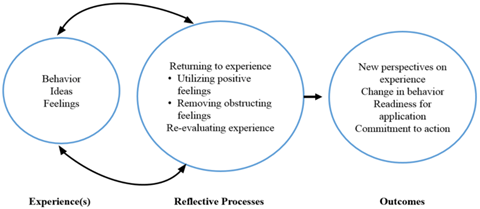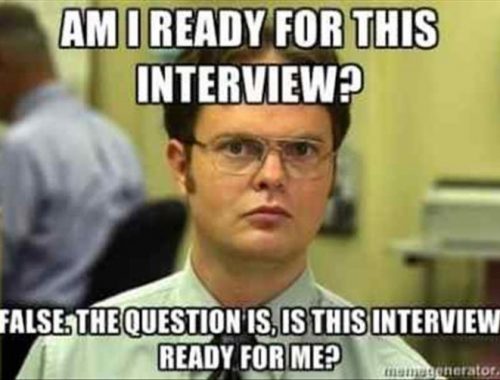A High-Pressure Simulation
In this blog, I will be applying the model of reflection proposed by Boud, et al., (1985) to systematically reflect on my experience of the simulated interview session.

Model of Reflection in the Learning Process (Boud et al., 1985)
A Restless Night of Preparation
My chosen job description was a Graduate Audio Technician role that had been recently advertised online by a recruitment company. The description was brief, as was the list of candidate criteria, so I was expecting to be asked several general interview questions in addition to a few role-specific ones. The night before, I had taken some time to prepare my answers to potential questions and to practice using the STAR technique. This gave me greater confidence in my answers and allowed me to structure them in a logical, coherent manner. Looking back, I would have benefited from more extensive preparation to be better prepared to communicate my answers fluently, and to have a clearer recollection of the various work-related skills that I could describe.
I was also struggling to get enough sleep that night – something that I often face before such important events. As a result, I was feeling fatigued and a bit restless in the morning. Naturally, this would have a detrimental impact on my interview performance. As I have now identified this to be a recurring problem, in future endeavours I will make a greater effort to prepare in advance by making the necessary adjustments to my daily routine to be fully rested before the interview, so I can approach it with vigour.
Enter the Simulation
As I began my interview, I was prompted to begin with an opening statement. I had prepared my response in advance, following the structure that was advised in our lecture on interview skills and giving examples of some of the skills I developed during my placement opportunities. One of the questions asked me to provide an example of a significant contribution I had made to a team, for which there was some hesitation in my answer, as I was contemplating the best example to provide. I attempted to answer as best as I could, making use of the STAR technique to structure my response. In answering other questions, I was able to reflect on my experiences during my placement, relating my answer to work-related skills I had developed and giving examples of how I managed to overcome certain obstacles. As the interview approached its end, an opportunity arose for me to demonstrate my subject knowledge in response to a technical question. My response came out somewhat rushed, however, and I missed the opportunity to go into more detail.
Having finished the interview, I received a feedback form a few minutes later. Areas of improvement were identified, which included: adopting a more confident approach, including more self-promotion of work-related skills, including more specific details in responses, and responding fully to double-barrelled questions. In addition, taking more time to pause and prepare for certain questions to form a stronger, more coherent response.
As described earlier, sleep-deprivation did little to aid my performance. I was feeling restless and had an underlying desire to complete the session as soon as possible. This was likely the reason I had rushed some of my responses, lacking the patience to more carefully consider how I could expand my answers to be more detailed and to include more examples of the work-related skills I have developed. Getting this right is essential if I hope to succeed in interviews, so I must make sure to prepare to exercise more patience when structuring my answers in the future.
During the session, I did not feel as though I lacked confidence, but I had fallen short in displaying enough confidence through my presentation and speech. This could simply be due to lack of experience, but it is likely that other factors were also involved. More extensive preparation could have improved my responses, as this would have allowed for a better, more thought-out structure. Further time spent refining and rehearsing my opening statement would leave a better first impression on the interviewer, which is crucial. Naturally, one cannot predict every question that may be asked, so mock interview sessions such as this are extremely beneficial to improving the skills needed to be successful.
Several questions required some immediate reflection during the interview. Using the STAR technique was an effective way to structure such questions, however, it was evident that I would have benefitted from more practice using this technique. In addition, systematically reflecting on significant work-related experiences prior to the interview would be highly beneficial, as it would allow me to categorise my thoughts around each experience more quickly and effectively, resulting in more coherent and confident answers.
Overall, I believe that I have greatly benefitted from the interview session, having had the opportunity to practice and develop interview skills in a relaxed setting. Having thoroughly reflected on this experience, I have been able to identify several factors responsible for the shortcomings in my performance, as well as the actions I can take to address them.
Bibliography
Boud, D., Keogh, R. & Walker, D., 1985. Promoting Reflection in Learning: A Model. In: D. Boud, R. Keogh & D. Walker, eds. Reflection: Turning Experience Into Learning. Oxon: Routledge , pp. 18-40.
The Blabber Mouth...
You May Also Like

Job Interviews: Selling Yourself For A Pay Cheque
24 February 2023
The World of Theatre upon Reflection
30 November 2022
